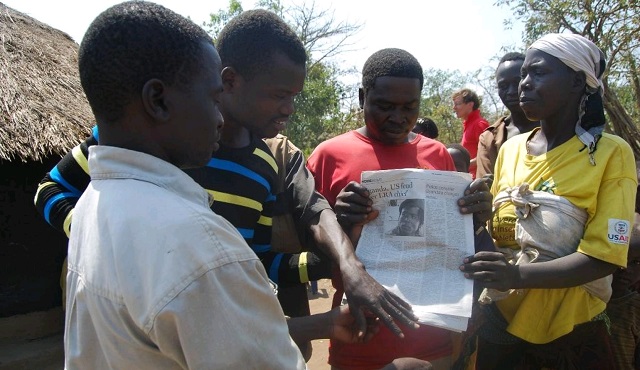
Kampala, Uganda | THE INDEPENDENT | Dominic Ongwen’s conviction at the International Criminal Court -ICC has reopened a grim memory of his abduction among his family and friends, and added more pain of perhaps never seeing him again.
Ongwen, the former commander of the LRA Sinia Brigade was convicted on Thursday of 61 out of the 70 counts of war crimes and crimes against humanity for which he faced a trial before the International Criminal Court. The charges relate to cases of murder, rape, torture, and sexual slavery committed during attacks in Pajule IDP camp on October 10, 2003, Odek IDP camp on April 29, 2004, Lukodi IDP camp on May 19, 2004, and Abok IDP camps on June 29, 2004.
Justice Bertram Schmitt who read out the judgment noted that Ongwen was guilty of leading attacks in the four IDP camps, commanding his men to break into shops, looting food and livestock, medicine, household goods, the killing of young children, adults, forceful conscription and sexual slavery.
But this account aroused a somber mood across Coo-rom village, Lamogi sub-county in Amuru district, the birthplace of the former warlord. The relatives here recall the day in 1987 when their son, then aged nine was abducted by the rebels while on his way to school.
His 69-year-old paternal uncle Johnson Odonga says that since then, they never set eyes on Ongwen who was a humble child before being turned into a brutal killing “machine”. Odonga is bothered by the conviction and says that Ongwen deserves a pardon because he grew up in captivity where his abductors taught him only how to fight and kill.
“It’s sad that he is convicted over crimes that should have been for his seniors who trained him. He was just a young boy taught how to kill and fight,” He told Uganda Radio Network in an interview. It is in the same vein that Ongwen’s wife Dilis Abang says she had hoped for leniency from the judges.
Like Ongwen, Abang now 28 years-old was abducted in 2005 from Minakulu in present-day Oyam district. The same year, she became Ongwen’s wife while in captivity and together they have four children, the youngest, a two-year-old she conceived from The Hague-based ICC detention where she visited him. Abang says Ongwen is a victim of circumstance just like her.
She is bothered that the court found Ongwen guilty of sexual and gender-based crimes that include forced marriage, torture, rape, sexual slavery, enslavement, forced pregnancy, and outrages upon personal dignity, yet the person she knows was never ruthless and never laid a hand on her during their time together.
“They were hit with canes and sticks, some beatings knocked them unconscious, left them unable to walk and left permanent scars. The seven women had to perform different domestic duties, failing to perform these tasks led to punishment by beating,” Justice Schmitt narrated in his verdict noting that all seven women who were called Ongwen’s wives while in captivity were subject to beatings at Dominic Ongwen’s command at any time.
But Abang says she never witnessed any incident in which Ongwen beat any of his wives. “None of his wives died, he kept them all well while in captivity,” Abang narrated before asking for a pardon for Ongwen to allow him to take care of his children.
“Whereas there were testimonies that Ongwen committed crimes in the four locations, we believe these were a result of the training he got and death threats he faced in case he failed to execute them. It would be unfair to say Ongwen solely commanded such attacks minus the orders of his seniors in the LRA,” he said.
But according to Justice Schmitt verdict, Ongwen faced no such death threats from the LRA rebel leader Joseph Kony and that he had the possibility of quitting the LRA like other commanders but he didn’t pursue the option. Rather, he rose in rank and position, including during the period of the charges.
“He committed some of the crimes in private, sometimes sexual crimes in the complete privacy of his sleeping place. In view of these circumstances, it is impossible to think that he could have committed his acts under any threats. Thus, there exists no ground excluding Dominic Ongwen’s criminal responsibility, his guilt has been established beyond any reasonable doubt,” the judge said.
Retired Kitgum Diocese Bishop Rev Macleod Baker Ochola described Ongwen’s conviction by the ICC as a “diversion” of justice from reality. He says it’s out rightly clear that Ongwen’s conscience was compromised by those who abducted him while still young and turned him into a killing machine.
The ICC has scheduled a sentencing hearing for the weeks of 12th-16th April during which it will receive submissions on the appropriate sentence by the Prosecutor, the Defence for Dominic Ongwen and the legal representatives of the participating victims.
Ongwen’s sentence may be up to 30 years of imprisonment (and under exceptional circumstances life imprisonment) and/or a fine since the Rome Statute, does not provide for a death penalty.
******
URN
The post Ongwen’s family broken by ICC conviction, “Our son was turned into a killer” appeared first on The Independent Uganda:.
from The Independent Uganda: https://ift.tt/36Rf78h
0 Comments